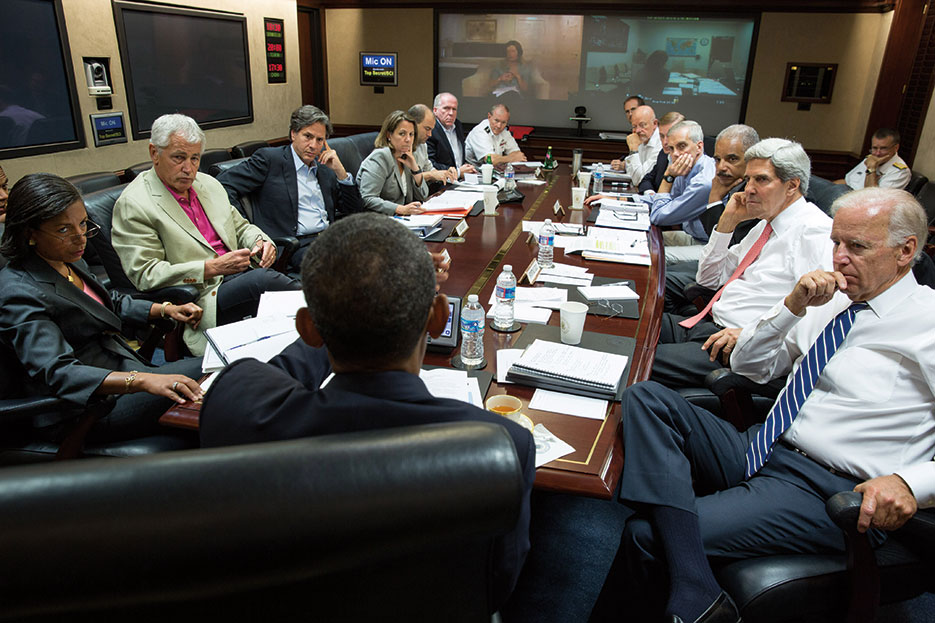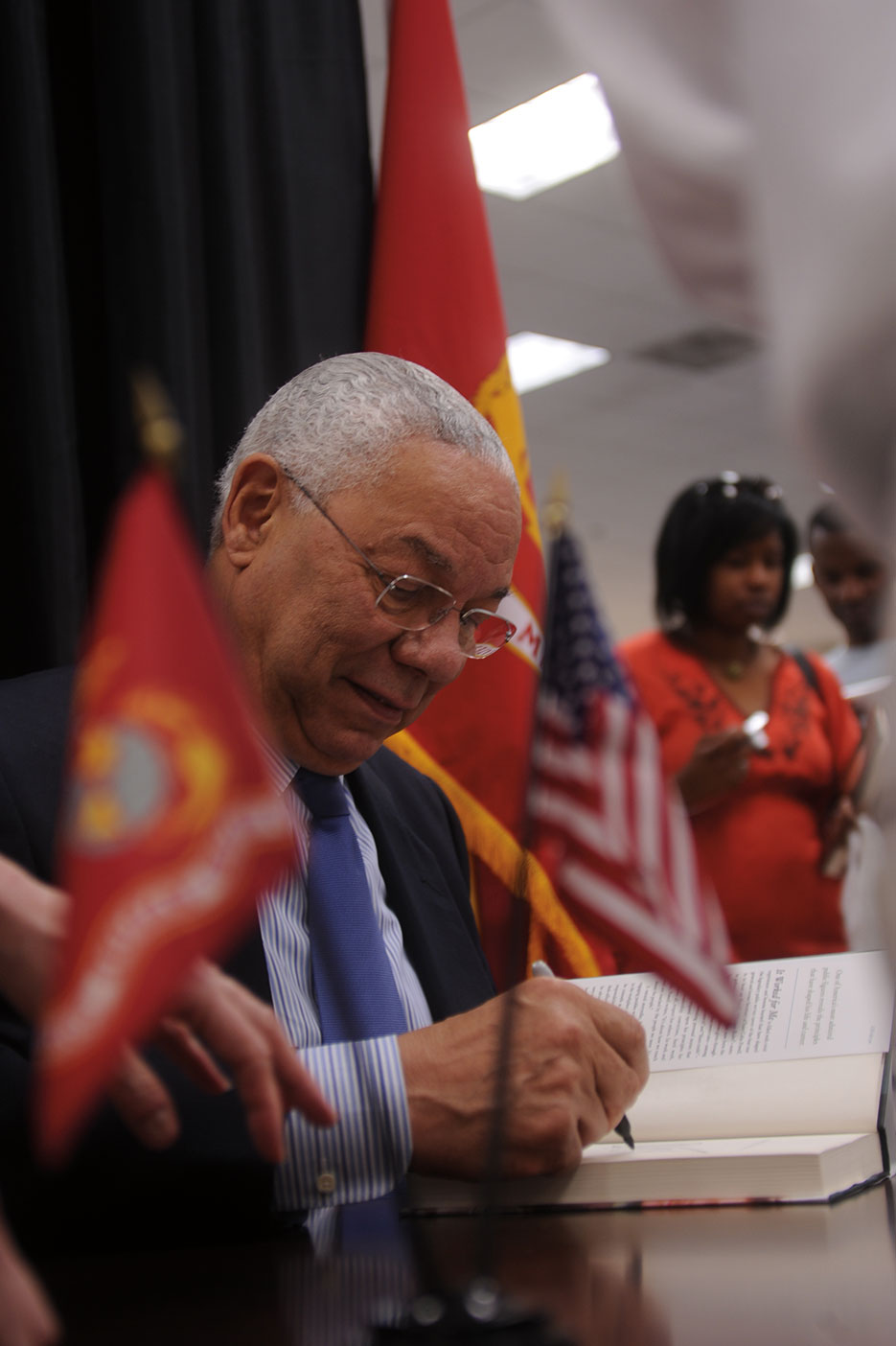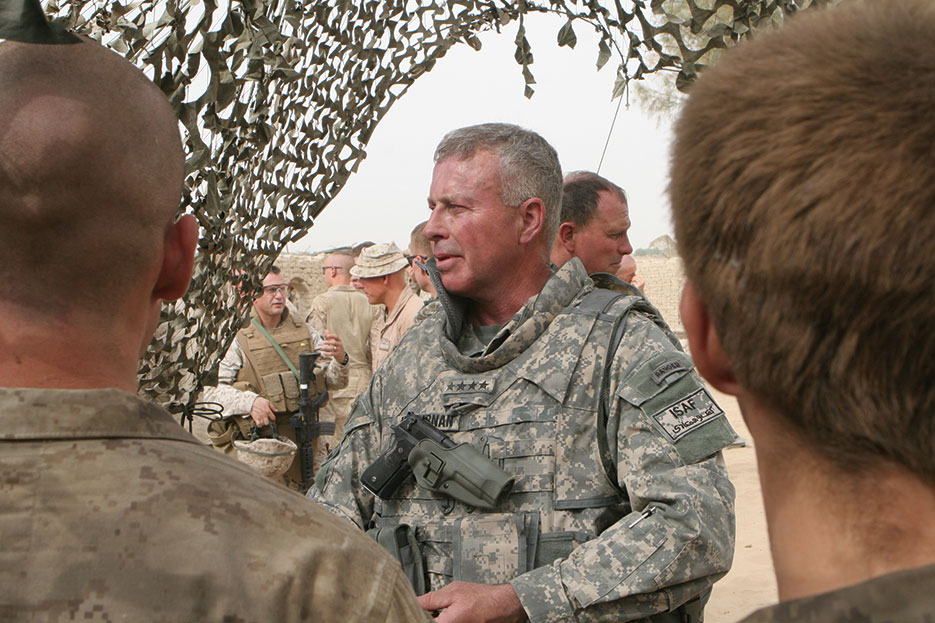Журнальный клуб Интелрос » Joint Force Quarterly » №76, 2015
Recently, during a symposium with security studies faculty members from civilian institutions, the question arose as to how those of us who teach in the country’s professional military institutions approach the study and use of policy analysis in our classrooms. There was a certain degree of incredulity that places such as the Naval War College (and its sister institutions) would encourage their students—people bound by oath to faithfully execute the orders of the commander in chief—to probe and analyze decisions taken by the current and past Presidents as part of their academic experience. Indeed, many question whether military officers need to engage in the dissection and discussion of national security decisionmaking since, echoing Alfred Tennyson’s famous exhortation in his classic poem “The Charge of the Light Brigade,” “Theirs not to reason why/Theirs but to do and die.” Others take the view that, for military officers, ignorance may be bliss, following the advice popularly ascribed to the German chancellor Otto von Bismarck: “The less the people know about how sausages and laws are made, the better they sleep in the night.”
Such a view helps to explain why, initially, the study of “politics”—the behind-the-scenes and often messy process by which national security decisions are made—was not deemed appropriate for officers. Soon after the formation of the Naval War College, however, that approach was reversed. In his lectures, Alfred Thayer Mahan noted that although the direction of national policy is properly set by the “statesmen,” political questions “are also among the data which the strategist, naval as well as land, has to consider”; Mahan explicitly renounced the notion, which he said “once was so traditional in the navy that it might be called professional,” that “politics are of no professional concern to military [officers].”1 Yet the concern remains that the captain or colonel who in the classroom is learning to use analytic perspectives to examine decisionmaking could upset an already precarious civil-military relationship by giving him or her additional tools “to frustrate or evade civilian authority when the opposition seems likely to preclude outcomes the military dislikes.”2 Policy analysis, after all, moves away from the more general study of the prevailing global and regional security trends (covered in the discipline of international relations) to concentrate on government decisionmaking.3 It is the proverbial “peek under the hood” at what underlies international affairs and is centered on understanding how policy is shaped and executed at the national level.4 Policy analysis focuses on probing the “whys” of governmental behavior—to open up and probe the “black box” of the decisionmaking process so that “one could . . . recognize the actual complexity underlying decisions (which includes individual biases and bureaucratic processes).”5

President Obama meets in Situation Room with national security advisors to discuss strategy in Syria (The White House/Pete Souza)
What seems to disturb people is that a sustained classroom examination of national security policy punctures the myth embodied in the “rational actor model”—that is, the idea that decisions are taken as a result of a deliberative process where all options are placed on the table and considered and where a choice is made based on the assessment of what best serves the national interest. It assumes, as Amy Zegart has noted, that the Nation’s decisionmaking process has been “structured to translate national objectives into national policies and to carry those policies out faithfully”—an approach she calls “theoretically elegant” but one that falls short of fully explaining how and why decisions are made.6 Thus, as Michael Clarke has observed, “Any study of a state’s foreign policy over a given period reveals that rather than a series of clear decisions, there is a continuing and confusing ‘flow of action’ made up of a mixture of political decisions, non-political decisions, bureaucratic procedures, continuations of previous policy, and sheer accident.”7
Policy analysis forces students to consider the influence of political agendas, personalities, rivalries, bureaucratic interests, the media, legislative input, and outside advocates and lobbyists, among others. It strips away the rhetoric of sacrifice in the service of vital national interests to reveal Robert Putnam’s “two-level game,” where, at “the national level, domestic groups pursue their interests by pressuring the government to adopt favorable policies, and politicians seek power by constructing coalitions among those groups. At the international level, national governments seek to maximize their own abilities to satisfy domestic pressures, while minimizing adverse consequences of foreign developments.”8 Objections to the study of policy analysis are similar to those voiced about the creation of fellowship programs that would allow officers and others to be placed as observers in senior levels of government, which argue that doing so is akin to “letting little children watch the sex act”—with a corresponding loss of innocence in discovering how “messy, disappointing, even shocking” the policy process can be—and potentially undermining confidence in how government functions.9
One concern is that officers might choose to ignore policy directives if they were to conclude that a particular decision was motivated not by a dispassionate analysis of the national interest, but resulted from a satisfying compromise between different bureaucratic interests or came about due to sustained lobbying efforts of a particular constituency. Even worse would be if the graduates of the country’s professional military education (PME) institutions decided to take this knowledge and use it to become policy makersrather than policy executors. Already, there are worries that
the military can evade or circumscribe civilian authority by framing the alternatives or tailoring their advice or predicting nasty consequences; by leaking information or appealing to public opinion (through various indirect channels, like lobbying groups or retired generals and admirals); or by approaching friends in the Congress for support. They can even fail to implement decisions, or carry them out in such a way as to stymie their intent.10
But are the country and its national security best served by having officers leave the schoolhouse never having been exposed to or applied the work of scholars and practitioners such as Graham Allison, Steven Krasner, Mort Halperin, Valerie Hudson, and Bob Jervis to real-world national security decisions? Should we worry that some officers may be inspired to become policy entrepreneurs and in so doing try to upset the balance of civil-military relations? Would a frank discussion in the classroom of the “other forces that drive U.S. policy (interest groups, lobbies, alliance commitments, legal constraints, geopolitics, etc.)”11 fatally undermine trust in—and acceptance of—civilian control? Would a detailed examination of the factors and influences that, for instance, led President George W. Bush to commit to military action in Iraq in March 2003 (or President Barack Obama to eschew the use of force against Syria in September 2012) compromise the authority of the commander in chief? My answer to these questions is a clear no.

Retired Army General Colin Powell signs books at Marine Corps Exchange aboard Marine Corps Base Quantico in June 2013 (U.S. Marine Corps/Sam Ellis)
First, these concerns can be mitigated by carefully framing how policy analysis is taught in the classroom. Partisan critiques, for instance, do not constitute policy analysis. Instructors must draw a clear line between policy analysis—a dispassionate assessment of the facts on the ground and the consequences and implications of the possible options for addressing a particular problem—and policy advocacy—marshaling arguments in favor of or against a particular course of action.12 Taught correctly, policy analysis focuses attention on the importance of structures and organizations, with an interest in the immediate decision environment, and then expands the discussion to encompass both domestic and international influences on policy. The goal of these exercises is to explain “process, as opposed to foreign policy outcomes.”13 In other words, the question we seek to have our students answer is to understand how and why decisions were made—rather than whether they were “good” or “bad”—through a more in-depth examination of “the actors, their motivations, the structures of decisionmaking and the broader context in which . . . policy choices are formulated.”14
Furthermore, there are a number of compelling reasons to have military officers study policy analysis. Many of those involved in the field of policy analysis see their work “as aimed at improving foreign policy decision making to enable states to achieve better outcomes.”15 National security decisions “involve a great deal of uncertainty” with a number of issues subject to debate; a study of policy helps those who will provide their professional opinions and be charged with the execution of policy directives to “understand the debate” and the factors that led to a decision.16 In addition, as graduates of PME institutions rise through the ranks, they are more likely to end up in positions to give advice or provide options to senior decisionmakers; an understanding of the policy process allows them to provide civilian decisionmakers with feasible and realistic alternatives.17Advice that is often given to public-sector scientists, and is just as apropos for military officers who are tasked to provide recommendations to civilian policymakers both in the executive branch as well as in Congress, is as follows:
[W]hen the major points of dissension in a policy debate are over values and preferences (the usual case), try to exhort decision makers to focus on these often fractious elements of the decision making process rather than the technical and scientific aspects. Debates of questions of science often end up serving as a surrogate polemic for the inability (or unwillingness) of decision makers to adjudicate unpleasant value and preference trade-offs. Do not fall into the trap of substituting debate over scientific information and interpretation of data for debate over which values and preferences will carry the day. . . . [B]e brutally honest with decision makers about the technical feasibility of each possible policy option and the uncertainties associated with the resulting . . . consequences. Often, the most useful input scientists can provide is to identify the estimated probability of success (for achieving the stated policy goal) for each of the various competing policy options.18
American professional military education places great emphasis on the study and application of strategy, and “senior military officers, first and foremost, must be knowledgeable about the planning and execution of military operations at the theater and strategic levels.”19 Yet such plans are not formulated in a vacuum. Instead, they are “an organized action or an integrated set of actions—from making public declarations to waging war—intended to bring about favorable consequences that will help achieve articulated national goals.”20 Indeed, the “management of violence”—identified by Samuel Huntington as the essence of the military mission—seems far too narrow given the much wider range of tasks that fall under the rubric of national security. Today’s military officer is really a “national security professional” whose expertise is expected to extend to the interconnected intellectual space of everything from strategic theory, strategic thinking, and strategy formation to diplomacy, nation-building, and homeland defense.21
Strategy often focuses on providing the “ideal” or “best” possible way to achieve goals. Policy analysis helps to explain why the “best” options may not always be available to or feasible for policymakers. Former Soviet leader Mikhail Gorbachev, building on another Bismarckian observation, noted, “Politics is the art of the possible, the emergence of agreed interests through a process of choice.”22 Theoretical options may not be available in reality. An air operation that is technically feasible might have to be scrapped if needed overflight rights over a country are not forthcoming. A mission might not be authorized if there is an expectation that it might lead to bad press coverage broadcast around the word on CNN and Al Jazeera. In his observations about the national security team of George H.W. Bush, Bob Woodward noted that decisions were evaluated not only on their strategic merit but also on their likely impact on Congress, the media, and public opinion; as a result, part of the policy process was focused on managing these reactions.23 The extent to which political considerations influence strategic decisions is something officers cannot ignore.
Indeed, senior military leaders and their staffs are not immune from the necessity of knowing how the political system operates. In an analysis of the decision taken in 2009 to retire General David McKiernan as commander in Afghanistan, Rajiv Chandrasekaran, a reporter for the Washington Post, concluded that the decision “reflects a view among senior Pentagon officials that top generals need to be as adept at working Washington as they are the battlefield, that the conflict in Afghanistan requires a leader who can also win the confidence of Congress and the American public.” Chandrasekaran went on to note that the definition of what constituted an effective senior military leader has been changing, quoting a senior Pentagon official: “The traditional responsibilities were not enough anymore. You had to be adroit at international politics. You had to be a skilled diplomat. You had to be savvy with the press, and you had to be a really sophisticated leader of a large organization.”24 Defense correspondent Thom Shanker of the New York Times concurs, pointing out, “Mastery of battlefield tactics and a knack for leadership are only prerequisites. Generals and other top officers are now expected to be city managers, cultural ambassadors, public relations whizzes and politicians as they deal with multiple missions and constituencies in the war zone, in allied capitals—and at home.”25
Working through the policy process, however, can be a type of cultural shock for career military officers. One staffer at the National Security Council observed that in his experience, military officers, particularly naval officers, wanted to go off in isolation and work on “The Solution” to a problem at hand—to provide the “best” strategic option. The problem, he noted, was that whatever was proposed would be dead on arrival unless there had been significant input and buy-in from all the key policy stakeholders. This is why Jon Anderson, a public policy analyst, counsels, “If you hold on too tightly to your policy formulation you will wither in this environment.”26 Policy analysis gives officers a basic fluency in the language of national security affairs as spoken by the members of the so-called strategic class—“the foreign-policy advisers, think-tank specialists and pundits”27 both within the government as well as those outside with whom they will be interacting.

General David D. McKiernan visited Marines with 1st Battalion, 6th Marine Regiment, 24th Marine Expeditionary Unit in Garmsir 6 days after assuming command of International Security Assistance Force (U.S. Marine Corps/Alex Guerra)
Holding to a supposed ideal that national security decisions ought to be “above” politics, personalities, and organizational interests—and structuring a PME curriculum that fails to educate students about the actualities of the national security decisionmaking process—constitutes an academic dereliction of duty by failing to prepare officers for the realities they will encounter. The process is explicitly and deliberately political. Speaking at the Naval War College more than two decades ago, when he was Chairman of the Joint Chiefs of Staff, General Colin Powell advised the students:
You are about at that point in your career now . . . when you have to have a better understanding of the broader context in which you are serving. When you have to have a better understanding of what is happening on the world scene. Where you need a better understanding of how politics works, of how public relations work, as to how you generate support for the armed forces of the United States. To make sure you understand the influences that are pressing on the Department and on your particular service.
It’s important for you, at this stage in your career, to . . . have a firm grasp of the outside pressures that come to bear, the political pressures, the public relations pressures. I am still not satisfied that senior officers coming up, or officers at this level, really understand the political context and how politics works in Washington. It’s not a dirty business. It’s the business that the “good guys” upstairs put in place.
Anybody who says that politics is nasty, and military people should stay away from it, or never become a political general—don’t worry about that—you’re not going to be successful. Politics is the way the country runs; it’s the way our Founding Fathers wanted it to run. So as you become more experienced, as you leave here and go on to jobs, start to understand the international situation a little more. Start to understand the political context in which we do our business. Start to understand the public relations and the media context in which we do our business. Because ultimately we are answerable to the American people, not by us giving speeches, but by us defending our actions to our political leaders, to those who have been elected over us, and by our explaining our actions through the media to the American people, and ultimately ensuring that we are doing what the American people wish us to do.28
Our goal as national security educators is to ensure that our graduates will be able to operate knowledgeably and professionally in this environment and recognize the forces at play in the decisionmaking arena. JFQ